|
De Amerikaanse schrijver Michael Anthony Dorris werd geboren op 30 januari 1945 in Louisville, Kentucky. Zie ook alle tags voor Michael Dorris op dit blog.
Uit: The Broken Cord
“One of its most difficult features for an outsider to grasp was the practice of almost always speaking, and thinking, in a collective plural voice. The word for people, "dene," was used as a kind of "we"--the subject for virtually every predicate requiring a personal pronoun--and therefore any act became, at least in conception, a group experience.
It was my second autumn in Tyonek. I had spent the morning interviewing an elderly woman, Mrs. Nickefor Alexan, the respected expert on subjects ranging from traditional herbal medicine to the do's and don'ts of appropriate courting behavior. In the course of our conversations, I consumed too much tea and my mouth was dry with the acidic taste.
I returned to my house in the afternoon and was uninterrupted as I organized my notes; most adults in the community were busy in their smokehouses, preserving and canning August's catch of fish, and the children, my frequent summer visitors, had returned to school. In a world of "we," I was an "I," with no essential responsibilities or links outside myself.
Periodically, I glanced from my window at the darkening sky. The twenty-four-hour circuit of day and night, upon which most of Western time is based, expands to a full twelve months in the far north. There is light enough to fish any time in the summer, and so the arbitrary schedules of passing salmon runs rather than a wristwatch dictate when dories should put to sea. The darkness is absolute in winter, underlined by forbidding temperatures that sometimes dip fifty degrees below zero. The short fall season, therefore, is a blend of both fatigue and melancholy, of final consolidation of the summer's gains and of preparation for the severity of approaching weather. It is a bridge of contemplation, of taking stock, and there is no occasion more appropriate for that practice than when the turning of the tide corresponds to the setting or rising of the low sun.”
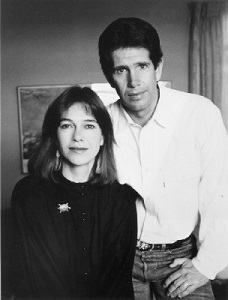
Michael Dorris (30 januari 1945 – 10 april 1997)
Hier met Louise Erdrich
De Engels-Amerikaanse schrijfster Barbara Wood werd geboren op 30 januari 1947 in Warrington. Zie ook alle tags voor Barbara Wood op dit blog.
Uit: Butterfly
“It could have been any island in any green sea in the world. A white villa stood at the top of a sheer cliff, overlooking aquamarine depths and crashing waves. An eighty-foot yacht rode at anchor, its crew in smart uniforms keeping the boat ready for the whim of the man and woman up on the cliff. There was an exotic swimming pool behind the white villa; a woman swam in it, reveling in the pure air and silence of her retreat. A feast had been set out under a gently flapping canopy: bowls of iced caviar, chilled lobster and crab, fruit frosted in sugar, cheeses imported from all over the globe, four kinds of wine standing in coolers. No one waited in attendance. The two lovers wanted to be alone.
She got out of the marble pool, climbing up the curved white steps and going between two Corinthian pillars to where chaise lounges covered in plush velour towels waited in the sun.
She moved languidly. She felt hot and sweet and ready for sex.
She didn’t remove her bathing suit. He would do that for her. Instead she stretched out in the heat and settled her eyes upon the television set that stood in the shade of the striped canopy. It was on. It was always on. She was waiting for something.
A moment later he emerged from the house, the shimmering water of the pool reflected in the lenses of his Ray-Bans. His long white bathrobe was open; he was naked underneath. She gazed at him as he walked slowly toward her. He was tall and lithe, with sinewy muscles and strong thighs; he walked with the stride of an Olympic gold medalist.
He came alongside her chaise lounge. She reached up with a lazy hand. The waves of heat rising mirage-like from the white walls of the villa seemed to melt her bones. She stirred on the thick towel, relishing the sensation of its creamy plush pile against her bare skin.”

Barbara Wood (Warrington, 30 januari 1947)
De Amerikaanse dichter en schrijver Richard Brautigan werd geboren op 30 januari 1935 in Tacoma, Washinton. Zie ook alle tags voor Richard Brautigan op dit blog.
The Galilee Hitch-Hiker
Part 1
Baudelaire was
driving a Model A
across Galilee.
He picked up a
hitch-hiker named
Jesus who had
been standing among
a school of fish,
feeding them
pieces of bread.
'Where are you
going?' asked
Jesus, getting
into the front
seat.
'Anywhere, anywhere
out of this world!'
shouted
Baudelaire.
'I'll go with you
as far as
Golgotha,'
said Jesus.
'I have a
concession
at the carnival
there, and I
must not be
late.
The American Hotel
Part 2
Baudelaire was sitting
in a doorway with a wino
on San Fransisco's skid row.
The wino was a million
years old and could remember
dinosaurs.
Baudelaire and the wino
were drinking Petri Muscatel.
'One must always be drunk,'
said Baudelaire.
'I live in the American Hotel,'
said the wino. 'And I can
remember dinosaurs.'
'Be you drunken ceaselessly,'
said Baudelaire.
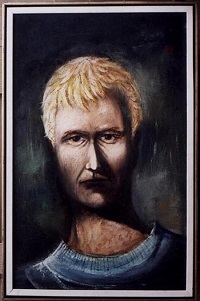
Richard Brautigan (30 januari 1935 – september 1984)
Portret door Kenn Davis, 1958
De Duitse dichter en schrijver Hans Erich Nossack werd op 30 januari 1901 geboren in Hamburg. Zie ook alle tags voor Hans Erich Nossack op dit blog.
Uit: Spätestens im November
„Der Oberbürgermeister erkundigte sich, was mein Mann zu der Wahl, die die Jury getroffen hätte, gesagt habe und ob er damit einverstanden sei. Ja sehr, antwortete ich, und er finde es großartig, wie alles gemacht sei. Es ging sie nichts an, dass Max sich überhaupt nicht mehr darum gekümmert hatte. Ich glaube, er wusste nicht einmal den Namen. Max hatte andere Dinge im Kopf; wer den Preis kriegte, war ihm nicht wichtig. Nur der Preis selber, und dass er auf seine Anregung gestiftet worden war, darauf legte er großen Wert. Es war eine Reklame für ihn. Oder für die Fabrik.
(…)
"Welch eine Freude, mein verehrter Herr Möncken, dass ich Ihnen noch persönlich die Hand schütteln darf. Ich konnte leider heute Nachmittag bei dem Festakt nicht dabei sein, ich hätte viel darum gegeben. Aber unsereiner ist nicht Herr seiner Zeit. Umso dankbarer bin ich meiner Frau, dass sie Sie hierhergebeten hat. Wirklich, ein großartiger Gedanke von ihr."
"Ich, und das geht den meisten von uns so, wir können es uns einfach nicht leisten, uns ablenken zu lassen. Die Helldegen-Werke zum Beispiel beschäftigen schon heute dreitausend Leute. Mit den Angehörigen wären es also rund zehntausend Menschen, deren Wohl und Wehe davon abhängt, dass bei uns alles klappt.
(…)
"Meine Eltern zum Beispiel, sie lebten so, wie es sein muss. Etwas andres kam gar nicht für sie in Frage. Meine Mutter hat nie auch nur versucht, meinen Vater zu verlassen; es ist komisch, sich so etwas überhaupt nur vorzustellen; sie wird nicht einmal die Sehnsucht gehabt haben. Aber nicht weil sie so glücklich war; glücklich waren meine Eltern nicht. Sie waren auch nicht unglücklich, ich weiß nicht, was sie waren; es war alles so tot und gleichmäßig, heute wie gestern und morgen wieder so und immer so weiter."
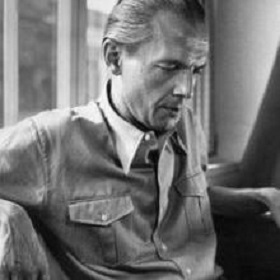
Hans Erich Nossack (30 januari 1901 – 2 november 1977)
De Estlandse schrijver Anton Hansen Tammsaare werd geboren op 30 januari 1878 in Albu. Zie ook alle tags voor Anton Hansen Tammsaare op dit blog.
Uit: The Misadventures of the New Satan (Vertaald door Christopher Moseley)
“Concerning that house which we built on my crossroads with your loan. You see, Jürka, this house is, so to say, part of the Pit, in as much as it was built with that land-improvement money, and during the time you were the owner of the Pit. And now it’s I who am the owner of the Pit, while you have become the tenant as before. But when you were merely the tenant you wouldn’t have received the loan, and you only got it when you became a property owner. I don’t know what you think about it, but the way I see it is like this: if you’re only a tenant and not the owner could the house which is part of the Pit belong to you? To make my meaning clear, here’s an example: suppose you have an axe and you sell it, would you say that the handle belongs to you after the deal has been made and the money for the axe has been paid you?’
‘I guess not.’
‘The handle, therefore, belongs to the chap who bought the axe, doesn’t it?’
‘I guess so.’
‘We’ve got it all clear then. The Pit is the axe, and the house on the crossroads is the handle, and since I’ve bought the Pit—the axe, in other words, the handle that came with it, meaning the house at the crossroads, also belongs to me.’
‘I see. The Pit was there before the house, of course.’
‘That’s what I say too,’ Ants said in agreement. ‘There was the Pit and then the house appeared—no Pit, no house, because what good is a handle if there’s no axe? . . ."
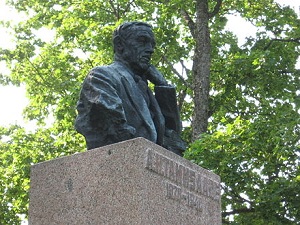
Anton Hansen Tammsaare (30 januari 1878 – 1 maart 1940)
Borstbeeld in Albu
De Engelse dichter en schrijver Walter Savage Landor werd geboren op 30 januari 1775 in Ipsley Court, Warwickshire. Zie ook alle tags voor Walter Savage Landor op dit blog.
Absence
Here, ever since you went abroad,
If there be change no change I see:
I only walk our wonted road,
The road is only walk'd by me.
Yes; I forgot; a change there is--
Was it of that you bade me tell?
I catch at times, at times I miss
The sight, the tone, I know so well.
Only two months since you stood here?
Two shortest months? Then tell me why
Voices are harsher than they were,
And tears are longer ere they dry.
You smiled, you spoke, and I believed
You smiled, you spoke, and I believed,
By every word and smile deceived.
Another man would hope no more;
Nor hope I what I hoped before:
But let not this last wish be vain;
Deceive, deceive me once again!
To sleep
Come, Sleep! but mind ye! if you come without
The little girl that struck me at the rout,
By Jove! I would not give you half-a-crown
For all your poppy-heads and all your down.
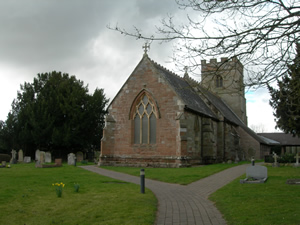
Walter Savage Landor (30 januari 1775 – 17 september 1864)
St. Peter’s Church, Ipsley Court
De Zwitserse schrijver Franz von Sonnenfeld (eig. Johann Girr) werd op 30 januari 1821 in Witterswil geboren. Zie ook alle tags voor Franz vob Sonnenfeld op dir blog.
Uit: Aus den Schweizerbergen (Der Bezirksschreiber)
„Solche schmerzliche Seufzer regten sich heute in mancher Brust und füllten die Augen mit wehmuthvollen Thränen. Von dem Kirchthurme der kleinen Gemeinde klangen zweitönig die
Glocken über die auf dem Gottesacker versammelten Dorfbewohner. Es war Allerheiligen Der Schluß der Nachmittagsvesper entließ heute die Andächtigen nicht wie gewöhnlich nach Haufe.
Kaum war das feierlich-jubelnde »Magnifikat« zu Ende gesungen, so bereitete man sich zu einer weiteren Feier vor. Im Chor der Kirche wurde ein Katafalk aufgestellt, während inzwischen der Priester und die Ministrauten in der Sakristei ihre hellfarbigen Gewänder mit der Farbe der Trauer vertauschten. Jetzt brannten die Lichter zu beiden Seiten des Katafalksz schwarzgekleidete Frauen kamen still und sittsam dahergetrippelt und zündeten an denselben ihre gelben und weißen Wachsstöcke an. Im veränderten Ornat, die schwarze Stol und die schwarzen Krägen mit Silberborden umrahmt, erscheinen Priester und Ministrauten wieder im Chor der Kirche. Auf die Lobgesange zu Ehren aller Heiligen folgt nun die Todtenvesper in klagenden, bittenden Melodien.
An das gemeinsame Fest aller Heiligen schließt sich die gemeinsame Feier aller Seelen, zuletzt mit einer Prozession auf den Friedhof.
Da knieten uun die Mitglieder der Gemeinde um die zahlreichen Gräber. Die Glocken, als fühlten sie die allgemeine Trauer mit, klangen heute offenbar wehmüthiger als gewöhnlich aus dem hölzernen, rothaugestrichenen Thurme. Und mancher Bursche und manches Mädchen, die sinnend hinaufsahen nach den allbekannten, so traurig tönenden Glocken, bemerkten auch, wie der schlanke Helm des Kirchthurms zitterte und Kreuz und Hahn hinüber und herüberwinkten wie das alternde Haupt eines von Kummer gebeugten Kirchenfürsten.“

Franz von Sonnenfeld (30 januari 1821 – 5 maart 1888)
Cover
|



